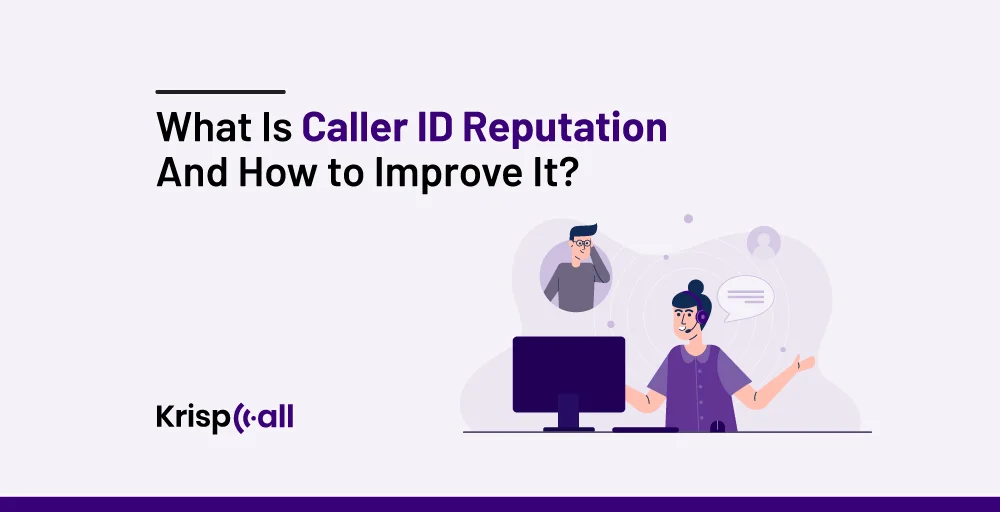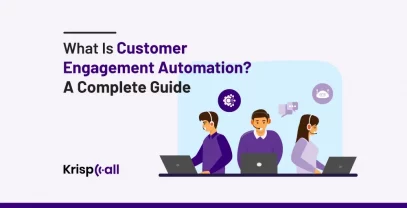You will likely be mistaken if you assume someone will answer a phone call from an unrecognized number with their caller ID. These days, many people screen their calls based on the caller ID for business or personal purposes.
Well, the reputation of the phone number affects whether someone will pick it up or let it go to voicemail. That’s why having a good caller ID reputation is important for businesses that need to contact new customers.
Caller ID reputation refers to how people perceive a phone number based on past call history and whether others have reported it as spam.
In this blog, we’ll discuss caller ID reputation and some best practices for improving the appearance of your number to recipients so they’ll be more likely to take your calls.
🔑 KEY HIGHLIGHTS
- Caller ID reputation refers to how people perceive a phone number based on its call history and whether it has been reported as spam.
- A positive reputation of caller ID increases trust, credibility, positive customer connections, outreach efficiency, and deliverability.
- Call habits, call volume, spam complaints, call connections, geographic patterns, and carrier standards affect reputation.
- To improve reputation, keep information accurate, create suitable call processes, monitor metrics/feedback, and obtain consent before contacting leads.
- Technologies like ACD, dialer software, and dynamic scripting can help optimize processes to strengthen caller ID reputation over time.
What Is Caller ID Reputation?
Caller ID reputation, also known as caller ID health or phone number reputation, refers to a rating given to telephone numbers that evaluate whether the phone number is legit. Major carriers like AT&T, Verizon, and T-Mobile assign each number a reputation score. The score represents whether a number is more likely to be a genuine caller or someone engaging in unsolicited contact, such as spam or scams.
The score affects how incoming calls from that number are treated. To determine the rating, carriers consider factors like call volume, carrier history, location, and spam reports. They examine these factors to protect their customers from unwanted or unsafe calls.
In other words, caller ID reputation evaluates a phone number’s history and patterns with telecom providers. Based on that analysis, carriers can flag risky numbers or block calls to maintain service quality and consumer security.
How Does Caller ID Reputation Work?
Caller ID reputation score works based on several factors. One of the main factors examined is how often calls are made from a particular phone number. If a number makes a lot of calls, it seems sketchy, like spam, which could lower the reputation rating.
On the other hand, if a number has a history of mostly making regular, okay calls, the rating is likely to get better. However, any numbers reported as spam or scams will get a worse score, whereas numbers people say they trust and that seem real and honest will generally get a higher rating.
Feedback from people who pick up the call is important. The rating companies want to know if receivers like or dislike calls from a specific caller ID. So, how callers act and what receivers report about them affect the ID’s reputation. The more positive opinions, the better the score.
Benefits of Having A Positive Caller ID Reputation
Having a positive Caller ID reputation provides various benefits, such as:
1. Increased Customer Connection and Trust
Having a caller ID with the business name visible hugely boosts customer confidence. This leads to higher sales, more people answering calls, and repeat customers. When people see an ID they recognize as legitimate, they are less likely to think the call might be a scam, which increases customer engagement and trust.
2. Increased Credibility and Opportunity for Partnerships
Having a caller ID with a good reputation increases credibility and collaboration opportunities. A caller ID that shows the company is legit aids in reaching out to establish fresh contacts and relationships. The verified ID signaling the calls are legit improves the chances of collaboration by building initial confidence in the organization.
3. Strengthened Personal and Work Connections
Having a positive caller ID reputation enhances communication in professional and personal situations. It shows a commitment to being upfront and consistent, which helps to build relationships. A caller ID with a strong history promotes honesty and quality exchange no matter the context. This cultivates deeper understanding and cooperation, whether it’s for business or personal matters.
4. Maximize Outreach Efficiency
Calling with a trusted caller ID is beneficial for your outreach efforts. A verified number helps your calls be received well. Potential customers are likelier to engage when they see a reputable caller ID. This opens doors for productive conversations that can help your business. Ensuring contacts understand who is calling makes each outreach interaction more efficient.
5. Enhance Deliverability
It’s important for your calls actually to connect with potential customers. Having a verified caller ID enhances deliverability so contacts don’t miss out on what you have to offer. People are more likely to answer when they recognize the number calling as a trusted source. This lets you have meaningful conversations instead of calls going straight to voicemail.
How to Improve Caller ID Reputation?
Building trust so that people will feel comfortable answering your calls requires improving the reputation of your caller ID over time. Here are some strategies that can help strengthen how recipients view your caller ID:
1. Keep Relevant and Accurate Information
Maintaining accurate details associated with your caller ID is crucial to establishing trust. Make sure your company name, phone number, and other contact information are correctly registered with caller ID services and applied uniformly across all channels where customers may see them. Updating this information over time helps strengthen recipient confidence by reliably identifying your business no matter how they are contacted.
2. Create Suitable Call Processes
Creating suitable call processes is also important. Follow the rules, like not calling people too much in a short time. Don’t call numbers on the do-not-call list; take permission before calling a marketing number. Using polite talk when you call helps give others a good perception of your company—space out your calls so people are not annoyed. Speak to people respectfully using friendly scripts. These methods help them think positively of your business.
3. Track and Address Input
Monitor key metrics and customer input to address business customer service issues. Pay attention to call analytics and customer feedback to identify and fix problems that could damage your company’s reputation. Use analytics tools to track important data like answer rates, complaint frequency, and other relevant metrics. Addressing complaints quickly can help avoid negative publicity and slowly strengthen how your caller ID is viewed.
Factors Affecting Caller ID Reputation
It is important how a phone number is managed by telecom providers. The caller ID reputation shows this. Monitoring certain areas allows you to maintain or improve your caller ID reputation. This helps ensure calls connect with the right people without seeming like junk calls or scams.
The top 5 things that can impact a number’s reputation are:
1. Calling Habits and Amount of Calls
The number of outgoing calls compared to incoming responses strongly affects caller ID reputation. A high number of outgoing calls paired with a low answer rate can be a sign of spam. Phone providers monitor these patterns to find anything unusual. Dialer software that controls the volume and frequency of calls from each number helps avoid appearing suspicious. Dialer software ensures calls are spaced out properly to prevent flags.
2. Complaints of Spam
Reports from people marking your number as spam or fraudulent immediately impact its status. Phone providers collect these complaints, which they use to flag numbers that could be problematic. Ensure your calls apply to recipients, are sent only to relevant contacts, and follow telecommunication rules to minimize complaints tagging your number as spam. Getting fewer spam reports helps maintain a number’s reputation in good standing.
3. Call Connections and Length
Two other essential factors are the average length of calls and how often calls successfully connect. Calls that suddenly disconnect or have many rings without an answer could harm your reputation. You can improve how people see your caller ID by engaging in conversations and ensuring the percentage of connected calls is high. Taking calls or ensuring technical reliability so contacts are more likely to pick up reflects positively on your number’s standing.
4. Geographic Regularity
The location your calls seem to come from is also essential. Calls originating from places outside your normal pattern could cause some concern. Maintaining consistent calls from the same general geographical area builds trust with phone providers and recipients. Sticking to consistent locations when making calls helps strengthen your number’s reputation over time.
5. Carrier Standards and Changes
Telecommunication companies regularly update the ways they evaluate caller ID reputation. It is crucial to stay on top of these revisions to ensure all current guidelines are followed. Your number is less likely to be flagged if you routinely review any changes to carriers’ policies and adjust your calling habits accordingly. Maintaining evolving best practices helps solidify a phone number’s positive reputation.
Best Practices for Maintaining a Good Caller ID Reputation
To enhance your call ID reputation, here are some of the best practices to follow:
1. Refrain from making Red-Flagged Calls
Making too many outbound calls from the same number daily can increase the chances of those calls being “red-flagged” as suspicious. So, It’s better to space out calls from one phone number to reduce the number that might get flagged or blocked. To improve success rates, leverage an advanced dialing system to control patterns and minimize calls flagged incorrectly due to dialing volume or frequency.
2. Take a Strategic Approach to Call Scheduling
Thoughtfully deciding on a systematic call schedule can be valuable for improving caller ID reputation over time. It’s important to understand optimal timing—when and how often to contact people. Conducting calls in a more organized, planned manner makes a better impression than a negative one. Recipients will appreciate consideration for their availability.
3. Balance Inbound and Outbound Call Volumes
Strive to preserve a balanced ratio of inbound to outbound calls. If outbound calls greatly surpass inbound interactions, recipients may become justifiably wary or suspicious of telemarketing. An imbalance suggests undesired sales calls versus actual conversation, damaging your reputation. Don’t overwhelm contacts with too many outbound contacts to avoid blocked numbers.
4. Clearly Outline Call Purpose
Briefly providing context upfront helps build trust and the likelihood of success. Stating the reason for calling immediately establishes your credibility and shows respect for the recipient’s time. Clearly communicating the nature and goal of the interaction from the start allows the other person to properly understand and engage, preventing confusion down the line.
5. Obtain Consent Before Contacting Leads
Obtaining consent upfront is vital for maintaining a positive caller ID reputation. There are a few types of acceptable consent:
- Written consent is necessary to send marketing messages.
- Express consent is suitable for informational texts where the recipient agrees.
- Implied consent through an existing relationship can allow conversational SMS.
When possible, use 10-digit long codes (10 DLCs) that appear like standard phone numbers. Compared to shorter numbers, this improves deliverability and perception.
Conclusion
Businesses must uphold a strong caller ID reputation to develop credibility and reliability with clients. Sticking to the prescribed guidelines ensures calls get returned and avoids the unwelcome “Spam Likely” label. Besides defending against expensive scams, having a favorable caller ID status confirms the company as a trustworthy member of the local area.
Moreover, adhering to recommended strategies diminishes getting calls blocked by avoiding spamming habits and using dedicated phone lines. Implementing technology like Automatic Call Distribution (ACD) further strengthens reputation by optimizing contact execution. Thus, Staying consistent improves any phone number’s positive standing over time.
FAQ
How to Check My Caller ID Reputation?
To check your caller ID reputation, there are some methods you can follow, such as:
- Use tools like caller ID reputation
- Check with your phone carrier
- Listen to customer feedback
What Happens If I Have A Poor Caller ID Reputation?
Having a poor caller ID reputation can have the following impacts:
- Damaged Credibility
- Lower Response Rates
- Loss of Business
- Regulatory Issues
How Much Does Caller ID Reputation Cost?
A caller ID reputation can cost anywhere from $10-$20 per month.





